
Indicator scoreboard
EMU - Fourth quarter real gross domestic product fell 0.2 percent but was up 0.6 percent when compared with last year. Most GDP categories were unrevised compared to previously released results with the exception of capital investment, exports and imports, which were all revised up.
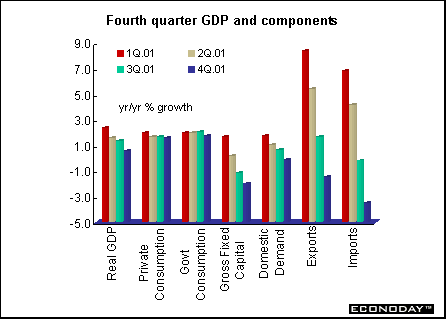
Germany - March seasonally adjusted unemployment fell by 8,000 because of new registration rules for the unemployed. The decline was the first since December 2000. The Labor Office cautioned that the improvement did not yet signal an improvement in the weak labor market. It estimated that seasonally adjusted unemployment likely rose excluding the effects of the new labor law. The seasonally adjusted unemployment rate remained unchanged at 9.6 percent according to the Bundesbank, while the EU harmonized seasonally adjusted rate, which is used by the ECB, was unchanged at 8.1 percent.
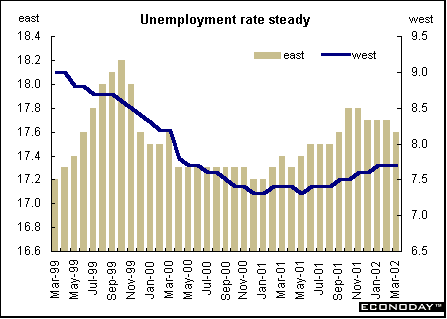
February merchandise trade surplus was E10.2 billion, up from a surplus of E10.1 billion in January 2002 (unrevised) and up from a surplus E7.1 billion in February 2001. Unadjusted exports fell 0.5 percent while unadjusted imports plunged 7.6 percent when compared with last year.
February real seasonally adjusted retail sales including autos and gasoline stations fell 1.2 percent and 1.7 percent when compared with last year. Retail sales excluding autos and gasoline stations fell 1.5 percent and 2.8 percent on the year.
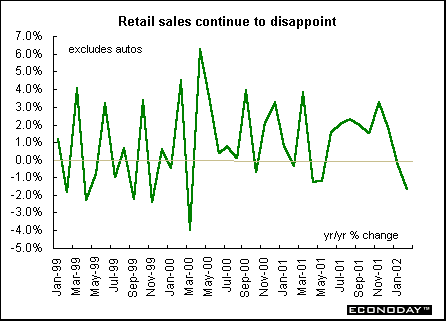
France - February manufacturing output rose 0.9 percent but was down 1.5 percent when compared with last year. Industrial output (excluding construction) rose 0.4 percent but was down 0.6 percent on the year. Output gains were led by autos, which were up 2.5 percent, while semi-finished goods rose 1.6 percent. By contrast, capital goods output slowed to 0.1 percent while consumer goods fell back 0.6 percent.
Britain - February global merchandise trade deficit widened slightly to Stg2.62 billion from Stg2.488 billion in January. Excluding oil and erratics items, the trade deficit widened to Stg2.957 billion from Stg2.832 billion previously. The non-EU trade gap widened to Stg2.066 billion following a Stg1.663 billion deficit in January. Exports and imports to non-EU countries both dropped. Excluding oil and erratic items, the non-EU balance widened to Stg1.641 billion from Stg1.218 billion. Whole world exports on a volume basis were down 3.4 percent on the month (excluding oil and erratic items), while imports were down 1.5 percent.
February manufacturing output rose 0.4 percent but fell 5.8 percent on the year. However, industrial production fell 0.2 percent on the month and 5.1 percent on the year. The relatively warm weather appeared to hit industrial output negatively with electricity, gas and water output down 3.9 percent and 2.9 percent on the year. Some of the hardest hit sectors in manufacturing bounced back in February. Telephonic, radio and electronic equipment output rose 5.8 percent although it was down 51.9 percent on the year.
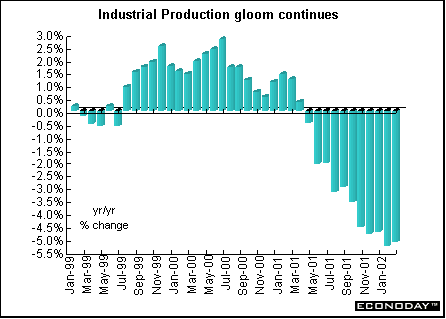
Asia
Australia - March seasonally adjusted unemployment rate fell to a 14-month low of 6.3 percent from 6.6 percent in the previous month. The economy added 21,200 new positions last month, the sixth straight gain. The economy added 36,500 full time jobs and lost 15,300 part time positions last month. Since January, employment has grown by 105,300, or 1.1 percent.
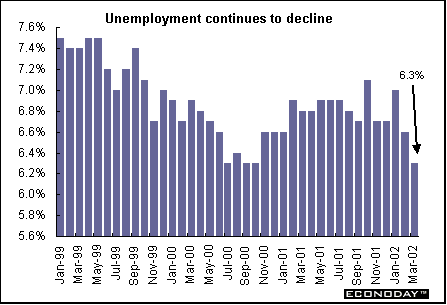
Japan - February seasonally adjusted current account surplus, the broadest measure of trade because it includes income from investment and services, narrowed to 1.12 trillion yen ($8.6 billion) from 1.24 trillion yen in January. Exports rose 3.3 percent, the second increase in a row. Imports rose 4.4 percent, outpacing the gain in exports as manufacturers bought more parts and materials overseas. The trade surplus totaled 848.1 billion yen - little changed from 844.6 billion yen in January. The services deficit, which includes overseas travel, widened to 426 billion yen from 417.7 billion yen as people resumed international travel after cutting back after the September 11. From a year earlier, the current account surplus widened to 1.41 trillion yen from a revised 1.36 trillion yen. Exports fell 4.3 percent and imports fell 1.9 percent, shrinking the trade surplus to 907.7 billion yen from 1.02 trillion yen a year earlier.
March bankruptcies rose for a seventh month by another 1,741. Total corporate failures rose 2.2 percent last month from a year ago, according to Tokyo Shoko Research. Four of the bankruptcies were publicly traded companies, pushing the total debt owed to 2.08 trillion yen ($15.8 billion). Thirteen publicly traded companies have failed so far this year, compared with 14 cases for all of last year. Bankruptcies were led by manufacturers, up 8.2 percent at 342 cases, and wholesalers, up 16.1 percent at 347. That more offset a 2.4 percent drop in failures at construction firms. Three financial institutions failed but this was 62.5 percent fewer than the same month a year ago. Teikoku Data Bank, another researcher that tracks corporate failures, said in its own report that bankruptcies for fiscal year 2000 were the second highest on record at 20,052.
 |


Last Week's Highlights • Global
Stock Market Indexes • Recap of Global Markets
• Currencies • Indicator
Scoreboard

The Bottom Line •
Looking Ahead
|